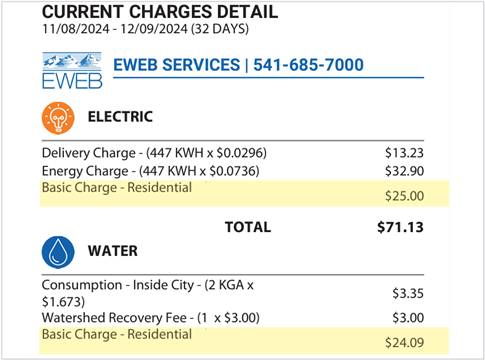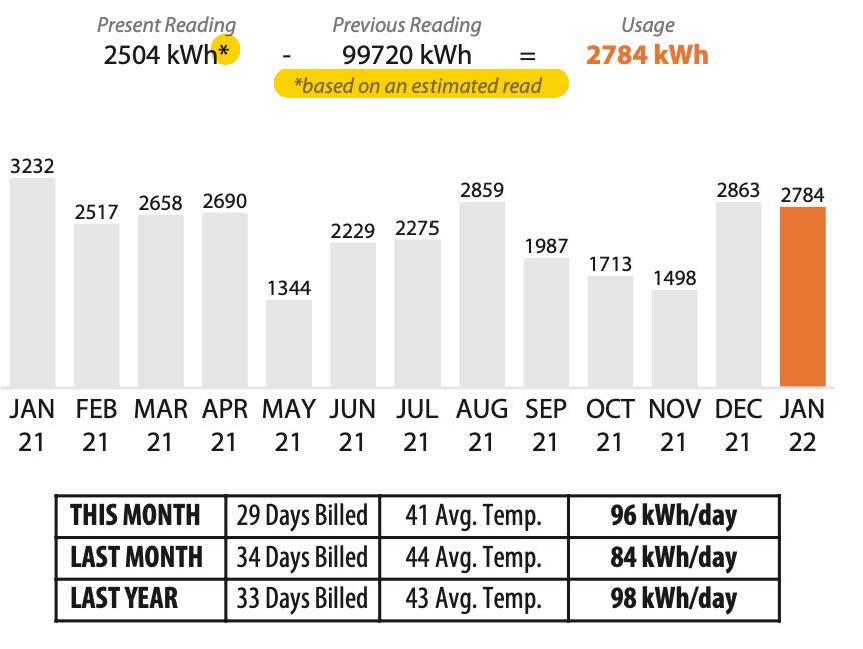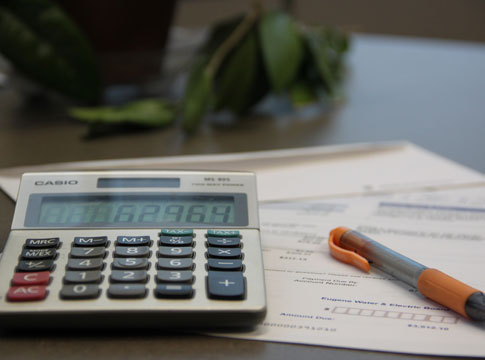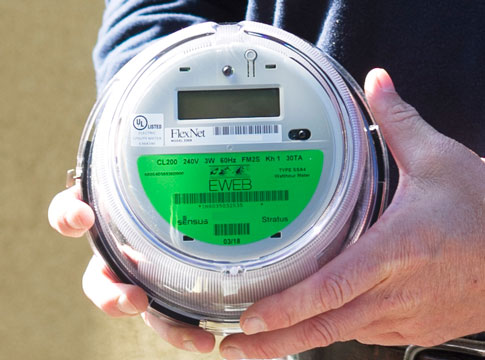We're here to help
Questions about your bill or payment? Ask a customer service analyst. We're open Monday - Friday.
By phone: 541-685-7000 from 8:30 a.m. to 5 p.m.
Send us an email
Your EWEB bill contains much more than just the current amount due. It also includes details about your usage, meter readings and other useful information designed to help you conserve energy and water and save money. Below is an overview of your bill.

In-person assistance
In-person customer service is available by appointment at Eugene's City Hall, 500 East 4th Avenue (the former site of EWEB headquarters). An EWEB Customer Service Agent can process ID verification, accept paperwork, help explain your bill, answer account questions, and assist with setting up an online account. To make an appointment, please call 541-685-7000.
Customer Service Agents are not able to accept payments at the City Hall location. Click here to learn about ways to pay your bill.
Definitions
Cost of Basic Service: Supports fixed costs such as metering, billing and customer service. This is a charge for having service available and is billed even if no water, electricity or wastewater services are used.
In some cases, a commercial building has multiple services, each of which has a basic charge. If you don't need separate meters for tenant billing, then combining electric services into one meter will reduce the basic charge. However, you usually must pay for an electrician to rewire the electric services.
Delivery/Demand Charge: Covers the cost of bringing power to your home or business, including maintaining the poles, lines and substations. (Commercial Customers - see More About Demand Charge below.)
Energy Charge: Covers the cost of producing the electricity and sending it long distance to EWEB’s distribution system.
Wastewater Consumption-based Charge: Dec. - April based on actual water consumption. May - Nov. based on previous winter’s average water consumption.
Watershed Recovery Fee: Temporary flat fee to pay for wildfire restoration projects in the McKenzie watershed, assessed based on meter size. For most residential and business customers, the fee is a flat $3 per month (based on a 1-inch or smaller water meter). Some customers, such as large businesses and those with extensive irrigation needs, pay more ($4.50 to $30 per month) based on meter size. The fee went effect mid-2021 and will be in place for 60 months (5 years), at which time it will automatically sunset.
Additional Services: This section highlights other utility services and charges, such as loans, rebates, Customer Care donations, account processing charges, late fees and collection charges, plus other special programs.
Due Upon Receipt: If "Due Upon Receipt" appears in the Payment Due box, you have an existing past-due balance. In this case, your bill is due immediately. If your account is past due, we may disconnect your service and additional charges are required to reconnect your service. If you feel you are unable to pay your bill in full by the due date, give us a call.
Reactive (power factor) power charge: Simply, a facility that runs many motors will produce a large inductive energy load called reactive power. We measure this reactive power to properly allocate power costs to each facility.
A standard Watt-hour meter does not record reactive power. When motors or other inductive loads cause a shift between voltage and current, more current must be generated and supplied to accomplish the same electrical work.
The reactive power meter measures the highest 15-minute period of reactive power in kVARs. When reactive power (kVAR) is significant in relation to true power (kW), energy providers call it low power factor. You can usually correct low power factor and reduce your reactive power charges by investing in power factor correction at your facility.
City of Eugene charges
Charges related to stormwater and wastewater appear in the water portion of customer bills, but are not EWEB charges. The City of Eugene owns and operates the stormwater and wastewater systems in Eugene. For efficiency, EWEB acts as the City's billing agent per City charter. If you have questions about these fees, visit the City of Eugene stormwater and wastewater websites or call the City of Eugene at 541-682-4900.

Basic charges explained
If you look at your EWEB bill, you will notice different types of charges that make up the total amount owed. These types of charges vary by customer class (residential, commercial, and industrial), but fixed charges (Cost of Basic Service) and volumetric charges (kWh and KGAL) are always present.
The fixed charge is intended to ensure each customer is paying a fair share of the cost to access electric and water services.
What do basic charges cover?
Estimated bills
While it is EWEB's intention to collect usage data from the meter each month, there are occassions when we need to estimate a customer's usage due to various circumstances such as weather, technical difficulties, complications accessing the meter, or due to changes in staffing.
If we are unable to collect the actual meter read, standard business practice is to calculate an estimate of the amount of energy and water you used in that billing period.
When actual usage is collected after an estimate, any difference between the prior estimation and your actual usage is automatically corrected. If our estimate was too low (your usage was more than we estimated), the difference between the estimated usage and your actual usage will be added to your next bill. If our estimate was too high (your usage was less than we estimated), you'll be credited on your next bill for the additional amount you paid.
Learn more...More about demand charge
When you turn on a piece of equipment, you expect to have enough power available to operate it. Because electricity isn't stored, it must be generated as it's needed. We must have access to enough generating and distribution capacity to meet all customers' maximum power needs.
Business customers pay a separate demand charge to cover the cost of having this capacity on reserve. Residential customers pay for this capacity through a higher residential energy rate. It's a bit like owning a car. You make loan and insurance payments no matter how much you drive. Those are fixed costs. If you only drive down to the corner store once a week, the cost per mile for driving will be high.
Examples 3 and 4 show two different cases with different demand charges. Operating all three motors at the same time in Example 4 creates 15 kW of demand, or three times the demand one motor creates in Example 3. This triples the demand charge. Notice that in both cases, the energy (kWh) use and the energy charge is the same. We use approximate and rounded energy and demand rates in these examples.
If your operation allows, you can reduce demand charges by staggering motor or other equipment use so that less total equipment power is on at any given time. You can manage your demand with controls, changes in your operation or improvements to equipment efficiency.

Related Programs
Reduce your energy and water waste. Our incentive programs can help with the upfront investment.
Scammers who pretend to be utility employees exploit the trust customers place in EWEB. Knowing the signs can help you fight back against scammers' constantly changing tactics.








